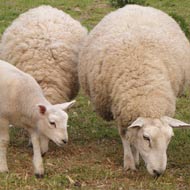
Call for vigilance as confirmed cases continue to rise
Farmers are being urged to submit lambs with suspected Schmallenberg virus (SBV) for post-mortem examination, as the number of confirmed cases continues to grow in England and Wales.
Lambing flocks across the country are reportedly seeing higher than normal losses from deformed lambs, and the disease has been confirmed in the south west, south east, north east and Wales.
According to figures from the APHA, lambs tested positive for SBV at 84 premises in England and 25 premises in Wales between December 2016 and February 2017. Three premises in England had confirmed SBV cases in calves during the same time period.
An industry statement said: ‘We have already heard of a number of cases and mainstream lambing and calving is only just starting. However, the Animal and Plant Health Agency (APHA) hasn’t received many samples so the true extent of the problem is not understood.
‘Farmers and vets are being urged to be vigilant through the lambing and calving period. It is very important that, if producers encounter lambs or calves with deformities, they contact their vets so post-mortem examination can be carried out to establish whether Schmallenberg is the cause…
‘Importantly we need to discover the true levels of the virus as this will determine activity later this year, which will seek to inform what action we need to take to protect against SBV going forward.’
SBV is transmitted by midges and can infect sheep, cattle and goats. If infected in the early stages of pregnancy, lambs and calves can be born with severe malformations.
Dr Simon Carpenter, head of entomology at the Pirbright Institute explained: “SBV is transmitted between ruminants by midges at a far higher rate than bluetongue virus and so spreads more quickly through farms. This might also mean that it can be transmitted effectively at lower temperatures and so extend the season during which the virus is a threat.”
There is currently no vaccine but one will reportedly be available this year, with further details to be confirmed shortly.
Further information on recent SBV cases, and arrangements for testing, can be found here: http://ahvla.defra.gov.uk/vet-gateway/schmallenberg/index.htm



 The Veterinary Medicines Directorate (VMD) is inviting applications from veterinary students to attend a one-week extramural studies (EMS) placement in July 2026.
The Veterinary Medicines Directorate (VMD) is inviting applications from veterinary students to attend a one-week extramural studies (EMS) placement in July 2026.